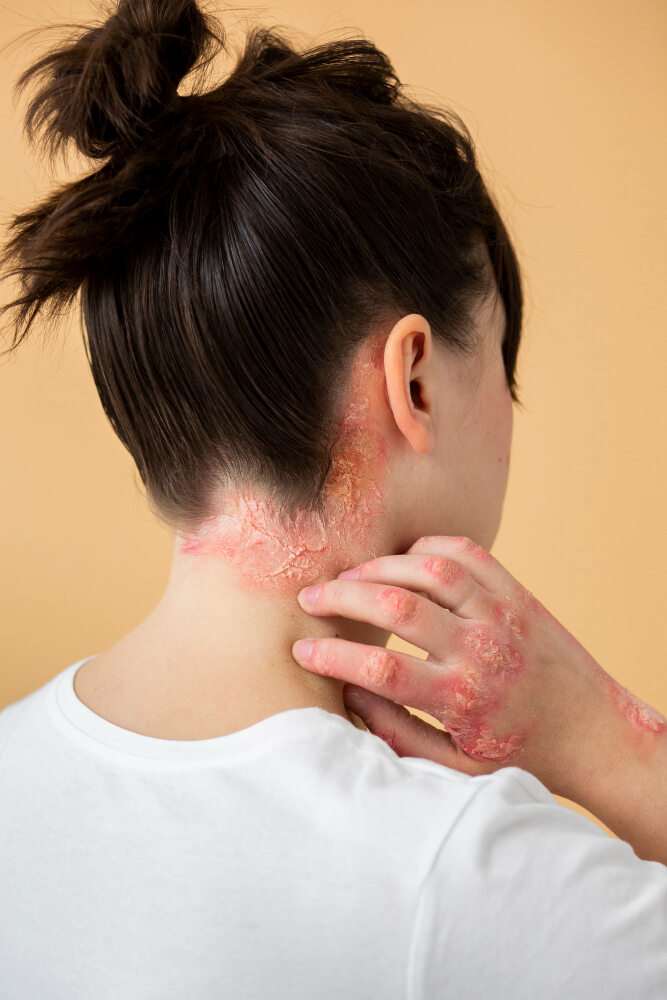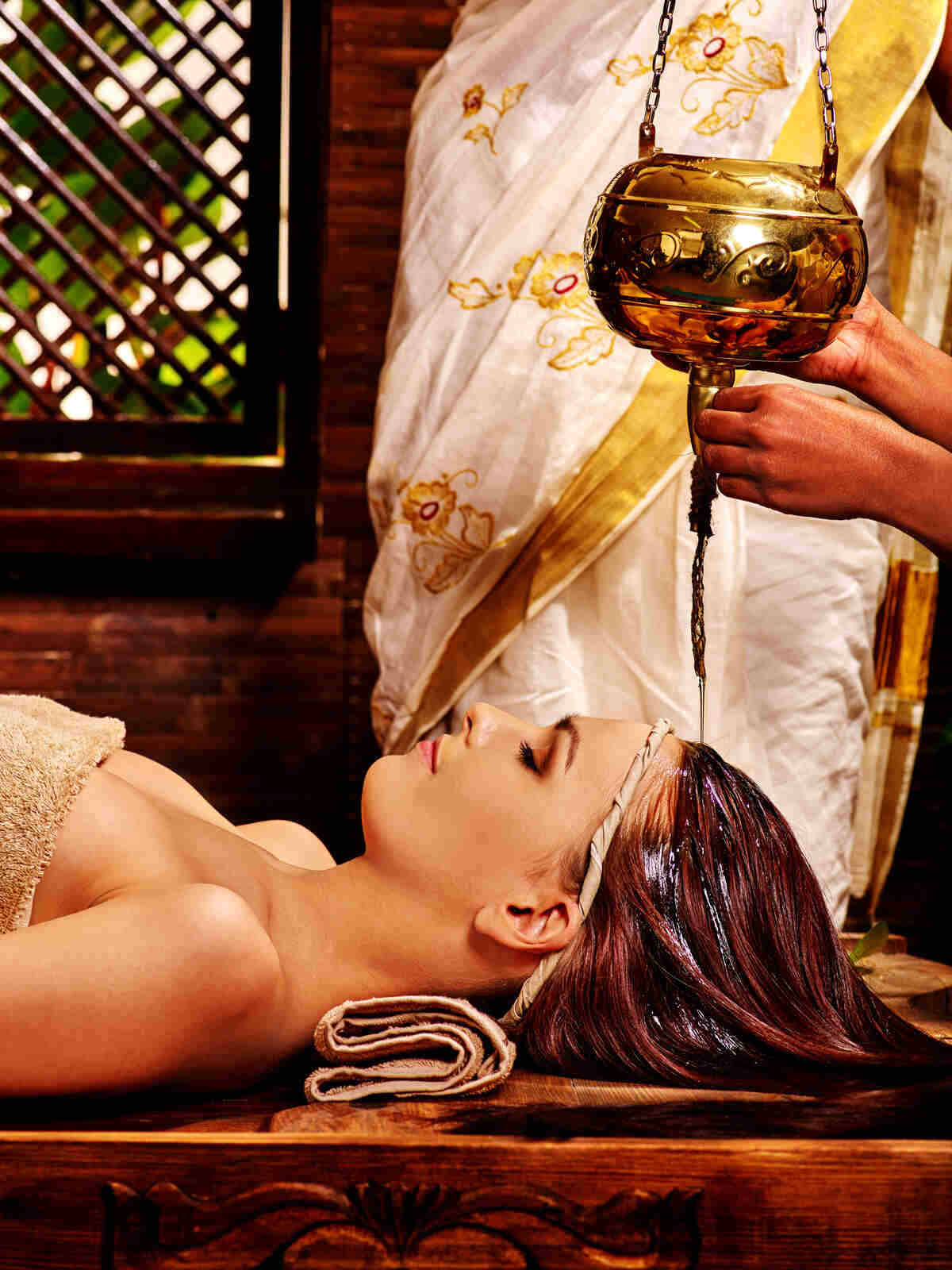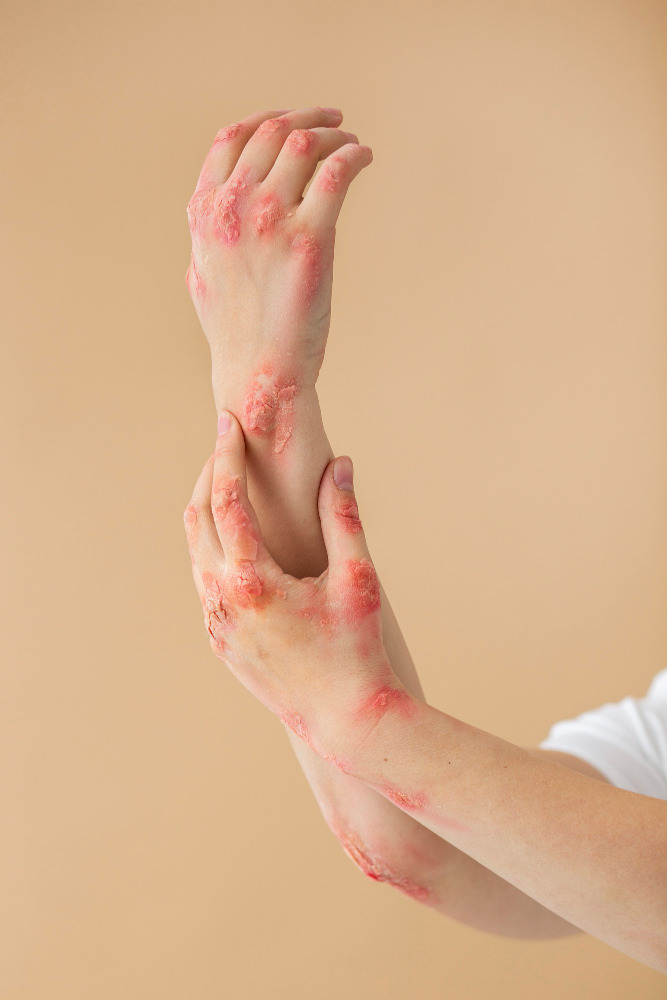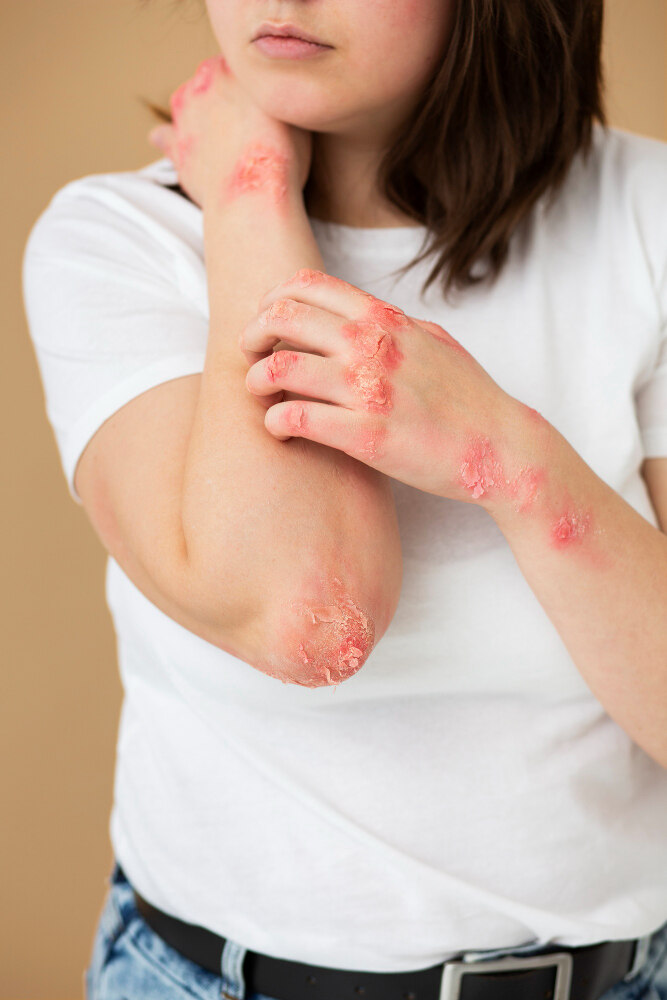Ayurvedic Treatment for Eczema
Niroga Ayurveda Healing ( Ayurveda Chikitsa / Treatments )
What is Eczema?


Why Choose Ayurveda for Eczema?
Ayurveda, the ancient Indian system of medicine, offers holistic and natural approaches to managing eczema. Ayurvedic treatments focus on balancing the body’s doshas, detoxifying the body, and strengthening the immune system, providing long-lasting relief.
Eczema Statistics:Hyderabad, India, and Globally
- Hyderabad, India: Eczema affects approximately 10-15% of the population.
- Globally: Around 20-30% of children and 2-10% of adults suffer from eczema.
Who is Frequently Affected by Eczema?
Eczema commonly affects specific groups of people, including:
Infants and Young Children:
Eczema often starts in infancy and young childhood, typically appearing within the first six months to five years of life. Babies may develop eczema on their face, scalp, and extremities, while older children may have it in the creases of their elbows and knees.
Individuals with a Family History:
A significant risk factor for developing eczema is having a family history of eczema, allergies, or asthma. Genetics play a crucial role, and children with parents or siblings who have these conditions are more likely to develop eczema.


People Living in Urban Areas:
Higher pollution levels in urban environments can exacerbate eczema symptoms. Pollutants, irritants, and allergens in the air can trigger flare-ups and worsen the condition. Urban residents are more exposed to environmental factors that can lead to skin irritation and eczema.
Understanding who is frequently affected by eczema helps in early diagnosis and effective management of the condition. If you or your loved ones fall into these categories and are experiencing symptoms, consider consulting with Sai Ayush Ayurveda Hospitals for personalized Ayurvedic treatments and care.
Eczema Causes and Aetiology
- Genetic predisposition
- Environmental factors such as allergens, pollutants, and irritants
- Immune system dysfunction
- Stress and hormonal changes
Eczema Symptoms and Signs
Eczema manifests through various symptoms and signs that can vary in intensity. The most common ones include:
Intense Itching:
The hallmark symptom of eczema is persistent itching. It can be severe, leading to scratching that worsens the condition and increases the risk of infection.


Red, Inflamed Patches of Skin:
Affected areas often appear red and swollen due to inflammation. The skin may feel warm to the touch and can be painful.
Dry, Scaly, and Thickened Skin:
Chronic eczema can lead to dry, rough patches of skin that become thickened over time. This condition, known as lichenification, results from repeated scratching and rubbing.
Blisters that May Ooze and Crust Over:
In some cases, eczema can cause small, fluid-filled blisters. These blisters may break open, ooze clear or yellow fluid, and then crust over, forming a scab. This process can be particularly uncomfortable and may lead to infection if not properly managed.
Recognizing these symptoms is crucial for early diagnosis and effective treatment. If you or someone you know is experiencing these signs, consider seeking professional help from Sai Ayush Ayurveda Hospitals for comprehensive Ayurvedic care and management.
Types of Eczema
- Atopic Dermatitis: Most common form, usually beginning in childhood.
- Contact Dermatitis: Caused by direct contact with irritants or allergens.
- Dyshidrotic Eczema: Affects the hands and feet with small, itchy blisters.
- Nummular Eczema: Characterized by round, coin-shaped spots.
- Seborrheic Dermatitis: Affects oily areas like the scalp and face.
Eczema Home Remedies and Prevention
Prevention
- Avoid known triggers and allergens
- Maintain good skin hygiene
- Use mild, fragrance-free soaps and moisturizers
- Wear soft, breathable fabrics
Home Remedies
- Coconut Oil: Moisturizes and soothes the skin.
- Aloe Vera Gel: Reduces inflammation and promotes healing.
- Turmeric Paste: Anti-inflammatory properties help reduce itching and redness.
Yoga for Eczema
- Pranayama (Breathing Exercises): Helps manage stress, a known trigger for eczema.
- Balasana (Child’s Pose): Promotes relaxation and reduces stress.
Detailed Ayurvedic Treatment Options for Eczema
- Panchakarma Therapy: Detoxifies the body and balances the doshas.
- Herbal Remedies: Neem, turmeric, and aloe vera are commonly used.
- Diet and Lifestyle Changes: Incorporate a Pitta-pacifying diet, rich in cooling, anti-inflammatory foods.
- Topical Applications: Ayurvedic oils like Kumkumadi oil are applied to affected areas.
- Abhyanga (Ayurvedic Massage): Helps in nourishing and healing the skin.
Detailed Ayurvedic Herbs for Eczema
Ayurveda offers a range of herbs that can help manage and alleviate the symptoms of eczema. These herbs work by balancing the body’s doshas, reducing inflammation, and promoting skin healing. Here are some effective Ayurvedic herbs for eczema:
Neem (Azadirachta indica)
- Properties: Antibacterial, antifungal, anti-inflammatory
- Usage: Neem leaves or neem oil can be applied topically to the affected areas to reduce inflammation and itching. Neem has potent antimicrobial properties that help prevent infections and promote healing.
Turmeric (Curcuma longa)
- Properties: Anti-inflammatory, antioxidant, antimicrobial
- Usage: Turmeric can be used both internally and externally. A paste made from turmeric powder and water or turmeric oil can be applied to eczema-affected skin. Turmeric helps reduce inflammation and soothe irritated skin.
Aloe Vera (Aloe barbadensis miller)
- Properties: Anti-inflammatory, moisturizing, healing
- Usage: Fresh aloe vera gel can be applied directly to the skin. It provides a cooling effect, reduces inflammation, and promotes healing. Aloe vera is excellent for moisturizing dry and scaly skin.
Manjistha (Rubia cordifolia)
- Properties: Blood purifier, anti-inflammatory
- Usage: Manjistha can be used both internally and externally. Topical application of Manjistha powder mixed with water or oil can help reduce redness and inflammation. Consuming Manjistha as a supplement can help purify the blood and reduce eczema symptoms from within.
Guduchi (Tinospora cordifolia)
- Properties: Immunomodulatory, anti-inflammatory
- Usage: Guduchi can be taken as a supplement or used in a paste form for topical application. It helps boost the immune system, reduce inflammation, and support skin health.
Licorice (Glycyrrhiza glabra)
- Properties: Anti-inflammatory, soothing
- Usage: Licorice root extract can be applied to the skin to reduce itching and inflammation. It is also available in supplement form for internal use to help manage eczema symptoms.
Calendula (Calendula officinalis)
- Properties: Antimicrobial, anti-inflammatory, healing
- Usage: Calendula oil or cream can be applied to the skin to soothe irritation, reduce inflammation, and promote healing. It is particularly effective for dry and cracked skin.
Kumkumadi Oil
- Properties: Antioxidant, anti-inflammatory, skin rejuvenating
- Usage: This herbal oil, made from a blend of Ayurvedic herbs, can be applied to the skin to improve complexion, reduce inflammation, and promote healing of eczema-affected areas.
Application Methods
Topical Applications:
- Herbal Pastes: Mix herbal powders with water or oils to form a paste and apply directly to the skin.
- Herbal Oils: Use oils like neem oil, turmeric oil, or Kumkumadi oil for massage or direct application on eczema patches.
Internal Use:
Herbal Supplements: Consuming Ayurvedic herbs in the form of capsules or powders can help manage eczema from within by balancing the doshas and purifying the blood.
Combining Herbs for Better Results
Combining these herbs with proper diet and lifestyle changes, as recommended in Ayurveda, can enhance their effectiveness. Always consult with an Ayurvedic practitioner to determine the best combination and dosage for your specific condition.
By incorporating these Ayurvedic herbs into your treatment regimen, you can effectively manage eczema and improve your skin health naturally.
FAQs
Frequently Asked Questions
Q:What is the best Ayurvedic treatment for eczema?
A:Panchakarma therapy, herbal remedies, and dietary changes are highly effective Ayurvedic treatments for eczema.
Q:Can Ayurveda cure eczema permanently?
A:Ayurveda aims to manage and reduce symptoms, potentially providing long-lasting relief and improving quality of life.
Q:Is eczema common in Hyderabad?
A:Yes, eczema affects approximately 10-15% of Hyderabad’s population.
Q:What are the signs and symptoms of eczema?
A:Symptoms include intense itching, red and inflamed patches, dry and scaly skin, and blisters.
Q:Are there any home remedies for eczema?
A:Yes, coconut oil, aloe vera gel, and turmeric paste are effective home remedies for managing eczema symptoms.
Fill out this form for booking online.
Appointment
Book An Appointment
Make sure to note down the appointment date, time, and location provided by the clinic. Set reminders on your calendar or set an alarm to ensure you are punctual and do not miss your appointment.
Customer Service
+91 84668 82266
WhatsApp Now
+91 84668 82266
Subscribe Now
SaiAyush Ayurveda

